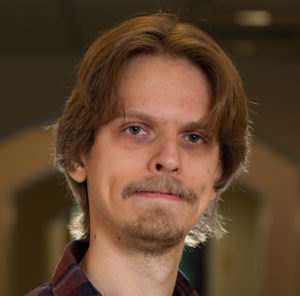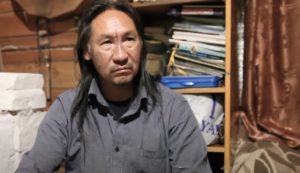
Stanislav Panin holds a PhD in Philosophy from Moscow State University and is a PhD candidate in the Department of Religion at Rice University.
During the past year, religious communities in Russia have expressed the whole spectrum of views concerning the war in Ukraine, ranging from unconditional support to implicit or explicit opposition. Several publications, including my own post for this blog, documented reactions of alternative religious and esoteric groups to the current political situation.
In this post, I would like to contribute further to the discussion by focusing on two cases related to Russian religious figures who attracted media attention over the past several years and whose followers eventually became involved in the public debate about the war. Despite the seemingly exotic nature of their teachings, grassroots alternative spiritualities provide valuable insights into the worldviews of a substantial fraction of Russian population. When discussing social and political issues, adherents of such views often avoid familiar political argumentation. Their worldviews, being inherently religious, treat political events as a part of the cosmic struggle between good and evil. However, underneath this metaphysical dimension, attempts to make sense of the world, society, and history are readily apparent. The ability to satisfy this quest for meaning makes such narratives particularly relevant and convincing for their audience.
The Revival of Russia and the Global Conspiracy
Last fall, several news outlets shared a story of Olga Tsukanova and her organization called the Council of Mothers and Wives when they called out Vladimir Putin’s highly publicized meeting with the relatives of mobilized soldiers as staged. This and the group’s other public activities prompted the authorities to legal action in order to shut the movement down and press criminal charges against Tsukanova.
To understand what motivated the Council of Mothers and Wives, it is important to consider the Council’s roots in the teachings of Svetlana Peunova. In the mid-1990s, Peunova founded a small religious movement that was effectively prohibited in 2016 when she was accused of financial fraud and endangering the mental health of her followers. The actual reason for this pressure, however, was related to the fact that Peunova actively criticized Russian authorities while trying to establish herself as a public figure and politician in the Samara region of Russia.
In 2012, Peunova registered a political party called Volya. The platform of this party summarized its goals as “achieving real democracy (narodovlastie) in Russia and the revival of Russia as a free, sovereign, democratic, economically developed, and self-sufficient country,” which also implied anti-globalism and opposition to Russia’s collaboration with organizations like WTO or NATO. It called for the return to many Soviet practices and, particularly, argued for the need for strong military forces modeled after the Soviet army.
In many respects, this rhetoric is close to Russian official sources. Nevertheless, Peunova and her followers do not support the current Russian leadership because they consider Putin and his allies to be among the global elites that Peunova and her supporters despise so much. They also subscribe to conspiracy theories derived from the writings of American and European writers like David Icke, whom Peunova and her followers carefully study. From Icke, Peunova borrowed the idea of the reptilian alien race of Annunaki who visited the Earth in mythical times and whose descendants, human-alien hybrids, form secret societies ruling the Earth.
Peunova reasoned that Russia’s participation in recent international conflicts is a result of the conspiracy in which Putin serves as a pawn of the hidden world elites who wish to start the Third World War. Consequently, in 2015, she recorded a video in which she unambiguously condemned Russian interventions in Crimea and Syria, saying that “when [the Russian military] occupied Crimea, we started taking pride in things we should be ashamed of. We occupied a foreign territory.”
Peunova believed that both interventions were Western schemes where Putin consciously played the role of a villain, simultaneously creating a negative image for Russia. The current war in Ukraine, according to Peunova’s followers, is also part of the plan of global elites where all sides serve a common hidden agenda. For the average Russian citizen, it means that a pacifist position is the most desirable because the war was never in Russia’s interests in the first place.
Exorcism of Evil Spirits
In 2019, Alexander Gabyshev from Yakutia started a march from Yakutsk to Moscow. He called himself a shaman and explained that his journey was a ritual to expel demonic powers that, according to Gabyshev, support and control Vladimir Putin. He attracted media attention after an anti-Putin demonstration in the city of Chita in July 2019 where Gabyshev delivered a four-minute speech. The march continued until September, when Gabyshev was arrested and eventually sentenced to involuntary mental treatment.

In the speech that made Gabyshev a prominent figure and eventually led to a police intervention, Gabyshev called for the return of power to local authorities and their independence from the federal government, direct control of the people over elected representatives, minimization of taxes, and the organization of recall elections in Zabaykalsky Krai. He called these demands “divine laws” necessary to achieve peace and prosperity.
In sharp contrast to the rhetoric of Russian officials that emphasizes collectivist values, national pride, and the power of the state, Gabyshev proclaimed the coming of a “new world” based on individual freedom and self-reliance. Gabyshev contrasted the current lack of freedom under Putin’s rule with the 1990s, about which he said in an interview to News.Ykt.Ru, [1] “back then life was hard but free. There was freedom of the press and everything else. We struggled financially because, naturally, the country was destroyed, everything was stolen. But as far as freedom is concerned, everything was fine.”
The situation in Ukraine was already a topic of interest for Gabyshev back in 2019. He praised Ukrainians for the Revolution of Dignity, pointing out that it allowed people to reclaim power over their country but expressing concerns that corrupt politicians might preserve their influence in the future. Last year following Russia’s invasion, Gabyshev, who is currently confined to a mental facility, interpreted the war as a manifestation of the negative energy that accumulated in people over time. He also pointed out that the issue was not unique to Russia and affected other countries as well and that the war was ultimately the result of the world’s overall condition.
Viktor Yegorov, who participated in Gabyshev’s original march to Moscow, recalls how in 2019 Gabyshev strongly opposed Russian military presence in eastern Ukraine and Syria by pointing out that those who supported it “participated in the fomenting of the demon’s war.” By “demon’s war,” according to Yegorov, Gabyshev meant that evil spirits can affect people’s thoughts and actions and that today they dangerously influence politicians worldwide, including Russian politicians.
Gabyshev’s associates share his anti-war sentiment. Yegorov, for instance, published an anti-war video on 7 March 2022 entitled Motherland, Stop the War! Another associate of Gabyshev’s, Andrei Lukjanov (also known as the Shaman’s Wolf, or simply Wolf), who decided to continue the march to Moscow after Gabyshev’s arrest, announced in August 2022 that the new motto of his journey should be “No to war in all its forms, peace to everybody, and freedom to the Shaman.”
What Can We Learn from These Cases?
The two cases, albeit different in many respects, share something in common. Both Peunova and Gabyshev created movements particularly appealing to ordinary Russians outside of Moscow and Saint Petersburg. In this regard, their ideas might be considered expressions of popular views about the world, politics, and spirituality. These movements represent different, in some ways opposite, sides of the political spectrum. Peunova’s followers dream about the restoration of the Soviet Union. Gabyshev clearly prefers the chaotic, yet more free Russia of the 1990s. Nevertheless, both share attitudes critical of the current Russian political system and consider the war in Ukraine unreasonable and unjust.
In these cases, we see characteristics of a possible grassroots political protest in Russia. To the extent possible, it would emphasize the need to build government from the bottom up and to vest power in local authorities who, in turn, should concentrate on local, domestic issues. What really bothers people in Russia is the local agenda as evidenced in the past—for example, environmental protests in Russian regions. This contrasts sharply with Russian official rhetoric that tries to compensate for the lack of meaningful solutions to domestic issues with speculations about geopolitics and national grandeur.
Popular spirituality, which acts as a mirror of popular culture, operates on a different plane than typical political language. It avoids familiar dichotomies, such as liberal vs. conservative and pro-Russia vs. pro-Ukraine. It even might, at times, overlap with the official rhetoric and yet, despite the similarity, it constitutes one of the most viable forms of dissent in Russia. The urge to confront, control, and prohibit alternative spirituality that the Russian government has consistently expressed during Putin’s tenure is the best proof that Russian authorities see it the same way.
[1] The media outlet News.Ykt.Ru closed in March 2022, and the interview is currently unavailable online.
